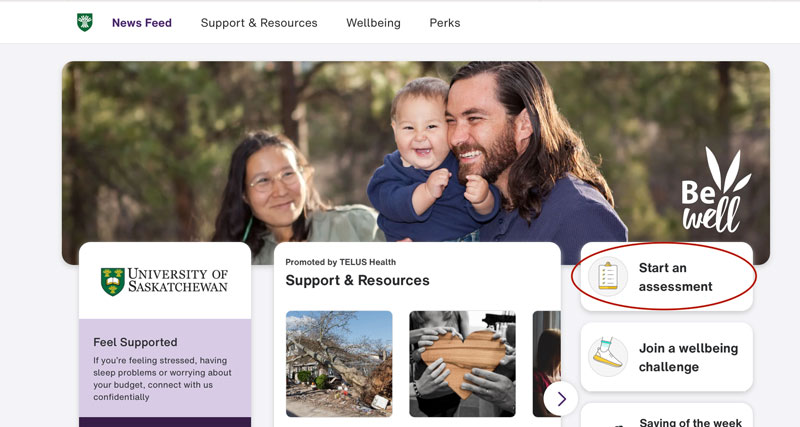Benefits of completing a Total Wellbeing Assessment
A Total Wellbeing Assessment (TWA) offers individuals a snapshot of their current health status.

Wellness Resources, in partnership with our EFAP Provider Telus Health (formerly Lifeworks), is offering employees an opportunity to win one of several prizes just by completing a Total Wellbeing Assessment (TWA) before October 31.
The assessment should only take 20 minutes and your progress is saved so you don’t need to complete it all at one time. The results of the assessment are completely confidential. To begin your assessment, visit Telus Health online or through the app and select the “Start an assessment” option.
A Total Wellbeing Assessment (TWA) is a process that is used to evaluate your potential health risks and identify areas where you can improve your overall well-being. It is a systematic approach that involves collecting information about your lifestyle, medical history, and various risk factors to assess your susceptibility to certain health conditions or diseases.
A typical Total Wellbeing Assessment involves a series of questions and measurements to gather data related to various aspects of an individual's health, including:
- Personal Information: This includes demographic details such as age, gender and family history of diseases.
- Lifestyle Factors: Questions about smoking habits, alcohol consumption, physical activity levels, diet and stress levels are commonly included to assess the impact of these factors on health.
- Medical History: Information about previous illnesses, surgeries, chronic conditions, and medication usage helps identify existing health issues and potential risks.
- Biometric Measurements: Measurements such as blood pressure, cholesterol levels, body mass index (BMI), and blood glucose levels may be asked to assess physical health markers.
- Psychosocial Factors: Questions about mental health, social support, and work-related stress can provide insights into an individual's psychological well-being.
Based on the collected information, the TWA generates a personalized health risk profile. This profile identifies specific risk factors and calculates the individual's overall health risk score, which indicates their likelihood of developing certain diseases or health problems. The assessment may also provide recommendations for lifestyle modifications, preventive measures, and appropriate healthcare screenings.
By identifying potential risks early on,TWAs can help you make informed decisions to reduce your risk and improve your overall health outcomes. Doing an ssessment is a good idea for several reasons:
- Early detection of health issues: TWAs often involve a comprehensive evaluation of an individual's lifestyle, medical history, and current health status. This assessment can help identify potential risk factors and early signs of chronic diseases or conditions. By detecting these issues early on, you can take proactive steps to address them and prevent further complications.
- Personalized health recommendations: TWAs provide personalized recommendations based on your health profile. These recommendations may include lifestyle modifications, screenings, vaccinations, or preventive measures specific to your health risks. By following these recommendations, you can adopt healthier habits and make informed decisions about their well-being.
- Increased awareness and knowledge: It provides you with valuable information about your body, lifestyle choices, and how you can improve your overall health. This knowledge empowers you to take control of your well-being and make informed choices regarding your lifestyle, diet, exercise, and medical care.
- Preventative healthcare: TWAs can help identify health issues before they become severe or require expensive treatments. By detecting and addressing risks early on, you can prevent or manage chronic conditions more effectively.
- Motivation for positive change: Completing anTWA can serve as a wake-up call and motivate you to make positive changes in your life. By seeing your potential health risks laid out, you may be more inclined to adopt healthier behaviors, such as quitting smoking, improving your diet, increasing physical activity, or managing stress levels. These changes can significantly improve overall health and quality of life.
It's important to note that a Total Wellbeing Assessment is just one tool in assessing an individual's health. It should not replace regular medical check-ups or consultations with healthcare professionals. However, it can provide valuable insights and act as a catalyst for positive change and improved health outcomes.
